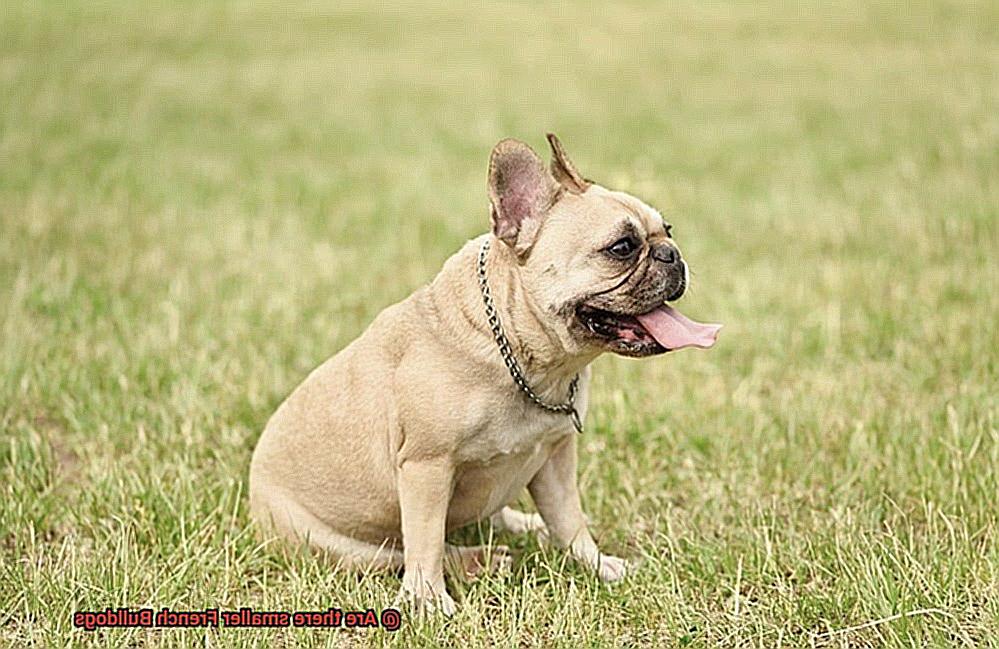Are there smaller French Bulldogs?
Are you a die-hard French Bulldog enthusiast?
If you are, then you’re no stranger to their irresistibly squishy faces and mischievous personalities. But here’s a little secret: French Bulldogs don’t just come in one size.
While the standard Frenchie is already compact and robust, there’s a whole world of smaller variants that pack just as much charm and character into a more petite package. In this blog post, we’re going to embark on an adventure through the enchanting realm of smaller French Bulldogs – those adorable mini or teacup Frenchies that have stolen hearts worldwide.
Whether you’re considering adding a French Bulldog to your family or simply have an insatiable curiosity about these delightful dogs, let’s dive headfirst into the captivating world of smaller French Bulldogs.
Origins and History of Miniature French Bulldogs
Contents
- 1 Origins and History of Miniature French Bulldogs
- 2 Characteristics of Miniature French Bulldogs
- 3 Health Concerns of Miniature French Bulldogs
- 4 Popularity of Miniature French Bulldogs
- 5 Finding a Reputable Breeder for a Miniature French Bulldog
- 6 Adopting a Miniature French Bulldog from a Rescue or Shelter
- 7 Pros and Cons of Owning a Smaller French Bulldog
- 8 Caring for a Smaller French Bulldog
- 9 Conclusion
French Bulldogs are beloved for their charming personalities and distinctive appearances. But have you ever wondered if there are smaller versions of these adorable dogs? In this article, we will explore the origins and history of Miniature French Bulldogs, also known as “minis” or “teacups.”
Origins and History:
The French Bulldog breed originated in England in the 1800s and gained popularity when lace workers migrated to France. In France, they became a symbol of sophistication and style among the Parisian elite. Over time, some breeders started selectively breeding for smaller sizes, aiming to create a more compact and portable version of the French Bulldog.
Breeding Process and Controversy:
The breeding process involved carefully selecting smaller individuals from existing litters and breeding them together, leading to the development of a distinct line of miniature French Bulldogs. However, it is important to note that these minis are not recognized as an official breed by major kennel clubs.
Controversy surrounds breeding miniature French Bulldogs due to concerns about their health and well-being. Some argue that intentionally breeding for extremely small sizes can lead to health issues, while others believe responsible breeding practices can mitigate these risks.
Responsibility as Potential Owners:
If you are considering adding a miniature French Bulldog to your family, it is crucial to research and choose reputable breeders who prioritize the health of their dogs. Ensure that both parent dogs have undergone health screenings and are free from any genetic conditions common in French Bulldogs.
Conclusion:
While miniature French Bulldogs may captivate dog lovers with their small size and unique appearance, potential owners must approach the breed with caution. Prioritizing the health and well-being of these dogs is essential. Be aware of potential health risks associated with breeding for extremely small sizes and be prepared for the additional care and attention these dogs may require.
Characteristics of Miniature French Bulldogs
Get to Know Miniature French Bulldogs: Big Personalities in a Small Package.
Miniature French Bulldogs, also known as mini Frenchies or teacup French Bulldogs, have become increasingly popular among dog lovers in recent years. Their compact size and charming appearance make them irresistible to many. But what exactly sets these little pups apart? Let’s dive into the characteristics of miniature French Bulldogs and uncover the secrets behind their big personalities.
Size: Small but Mighty
Miniature French Bulldogs are a smaller version of the standard French Bulldog breed. They weigh between 10 to 25 pounds and stand about 11 to 14 inches tall at the shoulder. Despite their diminutive stature, these little dogs possess all the distinctive features that make Frenchies so lovable.
Appearance: Cute and Expressive
With their sturdy build, broad chest, and short muzzle, miniature French Bulldogs have an unmistakable charm. Their large bat-like ears and round, expressive eyes add to their adorable appeal. These pups come in various colors such as brindle, fawn, white, or a combination of these colors. Some may even have unique markings on their coat.
Temperament: Friendly and Affectionate
One of the most endearing qualities of miniature French Bulldogs is their friendly and affectionate nature. They thrive on human companionship and enjoy being around people and other pets. Early socialization and proper training are essential for shaping their behavior and ensuring they grow up to be well-rounded dogs.
Exercise: Moderation is Key
Miniature French Bulldogs have moderate exercise needs compared to larger breeds. Daily walks and play sessions are usually sufficient to keep them happy and healthy. However, it’s important not to overexert them due to their brachycephalic (short-muzzled) structure, which can make them more prone to respiratory issues.
Health Considerations: Keep an Eye Out
While miniature French Bulldogs are generally healthy dogs, like any breed, they can be susceptible to certain health conditions. Respiratory problems, allergies, joint issues, and skin sensitivities are some of the common concerns. Regular veterinary check-ups, a balanced diet, and proper grooming can help mitigate these potential health issues.

Finding Your Mini Frenchie: Choose Wisely
When adding a miniature French Bulldog to your family, it’s crucial to find a reputable breeder who prioritizes the health and well-being of their dogs. Responsible breeders will conduct health screenings and genetic testing to ensure their breeding program produces healthy puppies.
Health Concerns of Miniature French Bulldogs
It’s crucial to be aware of the potential health concerns that may affect these lovable companions. In this blog post, we’ll delve into some common health issues faced by Miniature French Bulldogs, equipping you with the knowledge to provide them with the best care possible.
Respiratory Issues:
Miniature French Bulldogs are prone to respiratory problems due to their compact size and shortened snouts. Brachycephalic airway syndrome is a common concern, leading to snoring, wheezing, and breathing difficulties. Ensure your furry friend has a cool and well-ventilated environment, especially during physical exertion or hot weather.
Joint Problems:
Hip dysplasia is a condition where the hip joint doesn’t develop correctly, causing pain, lameness, and difficulty in walking. This issue affects both standard and Miniature French Bulldogs. Regular exercise and maintaining a healthy weight can help reduce the risk of hip dysplasia in your Mini Frenchie.
Dental Issues:
Compact jaws and crowded teeth make Miniature French Bulldogs more susceptible to dental problems such as gum disease, tooth decay, and misalignment. Implementing regular dental care practices like brushing their teeth and providing appropriate chew toys will help maintain their oral hygiene.
Skin Allergies and Sensitivities:
Sensitive skin makes Miniature French Bulldogs prone to allergies caused by environmental factors like pollen, dust mites, or certain food ingredients. Identify potential allergens, provide proper grooming routines, and nourishing skincare for your Mini Frenchie to keep their skin healthy and itch-free.
Genetic Disorders:
Like any dog breed, Miniature French Bulldogs may be at risk of certain genetic disorders. These can include patellar luxation (dislocated kneecap), eye problems like cataracts or cherry eye, and spinal issues like intervertebral disc disease. Responsible breeding practices and regular veterinary check-ups are essential to identify and manage these genetic concerns.
Popularity of Miniature French Bulldogs
These adorable pint-sized pups have been taking the dog-loving community by storm, and it’s not hard to see why. In this pawsitively informative blog post, we’ll explore the factors that contribute to the popularity of Miniature French Bulldogs and why they’ve become the apple of many dog lovers’ eyes. So grab a cup of coffee, settle in with your furry friend, and let’s get started.
Perfect for Apartment Living:
Living in a cozy apartment? Fear not. Miniature French Bulldogs are the ideal companions for urban dwellers. These compact cuties can comfortably fit into smaller spaces without compromising their happiness or well-being. Say goodbye to worrying about your pup feeling cramped in your humble abode.
Low Maintenance, High Love:
We all lead busy lives, and finding a dog that fits seamlessly into our hectic schedules can be a challenge. Luckily, Miniature French Bulldogs are low-maintenance compared to their larger counterparts. They require less exercise and grooming, making them pawfect for individuals or families with limited time on their hands.
Social Media Sensations:
In today’s digital age, social media plays a significant role in shaping trends and influencing our choices. Miniature French Bulldogs have taken Instagram by storm, thanks to their irresistible charm and photogenic qualities. Celebrities and influencers sharing adorable photos and videos of their pint-sized pups have undoubtedly contributed to the skyrocketing demand for these furry friends.
Reputable Breeders at Your Pawsteps:
Finding a reputable breeder is essential when considering bringing home a Miniature French Bulldog. Thankfully, there are breeders who specialize in these lovable little dogs and ensure that they are healthy, well-socialized, and meet breed standards. With the accessibility of these breeders, more individuals can give a forever home to a Mini Frenchie.
The Cutest Factor:
Let’s face it – Miniature French Bulldogs are undeniably adorable. Their large expressive eyes, shortened snouts, and perky ears make them irresistible to dog enthusiasts. And their compact size only adds to their cuteness factor, making them the pawfect cuddle buddies.
Finding a Reputable Breeder for a Miniature French Bulldog
When searching for a reputable breeder for a miniature French Bulldog, it is crucial to consider health testing as a top priority. As a responsible owner, you want to ensure that your new furry companion is healthy and free from genetic health issues commonly associated with the breed.
In this section, we will explore why health testing matters and how it can help you find a breeder who prioritizes the well-being of their dogs.
Why is Health Testing Important?
Identify and Prevent Genetic Health Issues:
French Bulldogs are prone to certain genetic health conditions such as hip dysplasia, patellar luxation, and brachycephalic syndrome. Health testing allows breeders to screen their dogs for these conditions and make informed breeding decisions. By choosing a breeder who performs health tests, you can significantly reduce the risk of your future puppy inheriting these conditions.
Promote Overall Health and Welfare:
A reputable breeder cares about producing healthy puppies and improving the breed’s overall health. Health testing helps identify dogs with underlying health issues that may not be immediately apparent. Breeders who prioritize health testing are more likely to invest in the well-being of their dogs, ensuring they receive proper care, nutrition, and veterinary attention.
Increase Longevity:
Genetic health issues can significantly impact a dog’s lifespan and quality of life. By selecting a breeder who conducts health tests, you increase the chances of bringing home a long-lived companion who will thrive by your side for years to come.
How to Evaluate Health Testing Practices:
Ask About Specific Tests:
Inquire about the specific health tests performed on the breeding dogs. Common tests for French Bulldogs include hip evaluations, patella evaluations, and genetic tests for common inherited conditions.
Review Certifications and Documentation:
A reputable breeder should be able to provide certificates and documentation to prove that their dogs have undergone health testing. These documents not only demonstrate the breeder’s commitment to transparency but also provide assurance that the puppies are less likely to develop genetic health issues.
Consider the Breeder’s Reputation:
Research the breeder’s reputation within the French Bulldog community. Look for breeders who are respected for their dedication to health testing and producing healthy puppies.
Adopting a Miniature French Bulldog from a Rescue or Shelter
These adorable little dogs may not be officially recognized as a breed, but they can still be found in rescue or shelter settings. However, before bringing one of these pint-sized cuties into your home, there are a few things you need to know. In this guide, we’ll walk you through the process of adopting a miniature French Bulldog, from understanding their unique needs to finding the perfect match for your lifestyle.
Research and Understanding:
- Miniature French Bulldogs may have smaller sizes due to genetics, health issues, or crossbreeding with other small breeds.
- Thoroughly research their specific needs and potential health concerns, such as respiratory problems or joint disorders.
- Consult with a veterinarian experienced in working with French Bulldogs to ensure you’re prepared for their care.

Gathering Information:
- Inquire about the dog’s background and medical history when adopting from a rescue or shelter.
- Ask about any existing health conditions or special care requirements the dog may have.
- Consider potential expenses for additional veterinary care or specialized diets.
Compatibility and Temperament:
- Ensure the dog’s personality traits and energy levels align with your expectations and capabilities as an owner.
- Spend time interacting with the dog to assess their temperament and compatibility with your lifestyle.
Adoption Process:
- Research multiple reputable rescues or shelters to find the right fit.
- Understand adoption fees and procedures, which may vary between organizations.
- Be patient throughout the process and keep an open mind to find your perfect companion.
Pros and Cons of Owning a Smaller French Bulldog
French Bulldogs have gained immense popularity in recent years, and along with it, the demand for smaller-sized French Bulldogs has also increased. While smaller French Bulldogs may seem irresistible due to their compact size and adorable appearance, it is essential to consider the pros and cons before making a decision.
Pros of Owning a Smaller French Bulldog:
Manageability:
- Smaller French Bulldogs are easier to handle and manage due to their reduced size and weight.
- They are more convenient to carry, especially for individuals with mobility issues or those who frequently travel with their pets.
- Their compact size also makes them suitable for apartment living or homes with limited space.
Health Benefits:
- Smaller French Bulldogs generally have fewer health issues compared to their larger counterparts.
- They are less prone to obesity, joint problems, breathing difficulties, and other related health concerns.
- Their reduced size may contribute to better overall health and longevity.
Lower Maintenance:

- Smaller French Bulldogs require less food, resulting in lower feeding costs.
- Grooming is also easier as they have less hair to manage.
- Veterinary expenses may be lower as they are less susceptible to certain genetic conditions associated with larger French Bulldogs.
Enhanced Bonding:
- Smaller French Bulldogs often form stronger bonds with their owners due to their increased dependence on human companionship.
- They are more likely to seek attention and affection, which can lead to a deeper connection between the pet and its owner.
Cons of Owning a Smaller French Bulldog:
Fragility:
- Smaller French Bulldogs tend to be more fragile and delicate compared to standard-sized ones.
- They are at a higher risk of injuries from accidental falls, rough handling, or even playtime activities.
- Extra caution is required when interacting with them to avoid causing harm.
Breeding Challenges:
- Breeding smaller French Bulldogs can present challenges as it requires careful selection of parents to ensure the health and well-being of the offspring.
- There is a higher risk of genetic abnormalities and health issues if breeders prioritize size over the overall health of the dogs.
- Prospective owners should research and choose reputable breeders who prioritize the welfare of their animals.
Limited Availability:
- Smaller French Bulldogs are still relatively rare compared to standard-sized ones.
- Finding a reputable breeder who specializes in smaller French Bulldogs may be more challenging.
- The demand for these dogs often exceeds the supply, leading to inflated prices and potential scams by unscrupulous breeders.
Caring for a Smaller French Bulldog
If you’re considering adding a smaller French Bulldog to your family, it’s important to understand the special care and considerations needed for this unique breed. Smaller French Bulldogs, also known as mini or teacup French Bulldogs, are not officially recognized by breed standards and are often the result of irresponsible breeding practices. However, with proper care and attention, these pint-sized pups can thrive and bring joy to your home. Here’s a comprehensive guide on caring for a smaller French Bulldog:
- Health Considerations: Smaller French Bulldogs may be more prone to certain health issues such as respiratory problems, joint issues, and dental problems. Regular veterinary check-ups are crucial to monitor their health and address any potential issues early on.
- Nutrition: Choose high-quality dog food specifically formulated for small breeds. These foods meet their nutritional needs and help maintain overall health. Portion control is essential to prevent overeating and obesity.
- Exercise: While smaller French Bulldogs don’t require as much physical activity as larger breeds, regular exercise is still important to keep them fit and mentally stimulated. Avoid excessive exercise or strenuous activities that could strain their joints or respiratory system.
- Grooming: Their short coat is relatively low maintenance, requiring regular brushing and occasional baths. Pay attention to their facial folds and keep them clean and dry to prevent skin infections.
- Temperature Sensitivity: Smaller French Bulldogs are more susceptible to extreme temperatures. Provide ample shade, fresh water, and avoid taking them out during the hottest parts of the day. In colder weather, consider using sweaters or coats to keep them warm.
- Socialization and Training: Expose them to different environments, people, and animals from an early age for proper socialization. Basic obedience training establishes boundaries and prevents behavioral issues.
- Temperament: Remember that size does not determine temperament. Smaller French Bulldogs have similar characteristics to standard-sized ones, known for their affectionate nature, playful personality, and love for human companionship.
By providing proper care and attention, you can ensure a happy and healthy life for your smaller French Bulldog. Remember to consult with your veterinarian for personalized advice and guidance. Now, go ahead and embrace the joy of having a pint-sized furry friend in your life.
Conclusion
In conclusion, it is a common misconception that there are smaller French Bulldogs.
However, the truth is that French Bulldogs come in a standard size and there are no officially recognized variations of smaller breeds. While some may claim to have “mini” or “teacup” French Bulldogs, these terms are often used by unscrupulous breeders who prioritize profit over the well-being of the dogs.
It is important to prioritize responsible breeding and choose a reputable breeder who focuses on producing healthy and well-structured French Bulldogs rather than promoting smaller sizes for novelty purposes.




